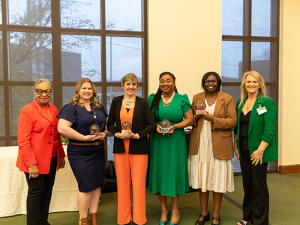Jill Clements, Ph.D., assistant professor of English, is the first recipient of the Michel de Montaigne Endowed Prize in the History of Ideas, awarded by the College of Arts and Sciences to a full-time UAB faculty member who pens a scholarly essay that encompasses a broad range of interdisciplinary concerns — including those at the intersection of cultural and intellectual history — and makes a unique contribution to the history of thought and culture.
 Jill Clements, Ph.D., assistant professor of English (left); the prize is named for 16th-century French essayist Michel de Montaigne (right), who popularized the essay as a literary genre.Clements’ essay, “Sudden Death in Early Medieval England and the Anglo-Saxon 'Fortunes of Men,'” explores the treatment of sudden death in early English literary representations of dying and the dead. For the Anglo-Saxons — the early medieval rulers of England — a good death, Clements explains, would not necessarily be quick; rather, a person would have had sufficient time to get their earthy and spiritual affairs in order, therefore ensuring a peaceful transition from life to death. The concept of sudden death subverts that idea, Clements says.
Jill Clements, Ph.D., assistant professor of English (left); the prize is named for 16th-century French essayist Michel de Montaigne (right), who popularized the essay as a literary genre.Clements’ essay, “Sudden Death in Early Medieval England and the Anglo-Saxon 'Fortunes of Men,'” explores the treatment of sudden death in early English literary representations of dying and the dead. For the Anglo-Saxons — the early medieval rulers of England — a good death, Clements explains, would not necessarily be quick; rather, a person would have had sufficient time to get their earthy and spiritual affairs in order, therefore ensuring a peaceful transition from life to death. The concept of sudden death subverts that idea, Clements says.
“The nature of one’s death was often thought to correlate with the fate of the soul,” Clements said. “The concept of ‘sudden death’ occurs in a number of medieval homilies and poems as an object lesson for the living: Because death can come at any time, one must always be prepared.”
In her essay, Clements cites a pair of catalogue poems, “The Fortunes of Men” and “Maxims I” from the Exeter Book, an anthology of Anglo-Saxon poetry compiled circa 975 A.D. Both poems contain what Clements calls “oblique lists of disconcerting bodily fates,” including the inexplicable deaths of children, and death by famine, wolf attacks, drunken brawls and falling from trees. Both “suggest death’s cold inevitability,” in Clements’ words. “Maxims I,” in particular, explores the spiritual condition of the doomed, stating that “foolish is he who does not know his Lord / often to him comes sudden death.”
|
“The concept of ‘sudden death’ occurs in a number of medieval homilies and poems as an object lesson for the living: Because death can come at any time, one must always be prepared.” |
The pair of poems appear in tandem in the Exeter Book and Clements contends that this positioning, in conjunction with their thematic similarities, offer unique insights into early medieval anxieties about death, the afterlife and the proper preparation required for both.
Clements’ essay was selected by a committee of senior CAS faculty members; she received a $1,000 cash prize and was honored at the CAS Faculty Book Reception. The essay was also accepted into a collection of essays titled “Dealing with the Dead: Mortality and Community in Medieval and Early Modern Europe.”
Catherine Daniélou, Ph.D., senior associate dean for Undergraduate Academic Affairs in the College of Arts and Sciences, established the Michel de Montaigne Endowed Prize in the History of Ideas this past fall in honor of the 16th-century French essayist who popularized the essay as a literary genre. The prize is reminiscent of UAB’s Frederick W. Conner Prize in the History Ideas, which the university awarded for several years and of which Daniélou was a recipient in 2010.



















